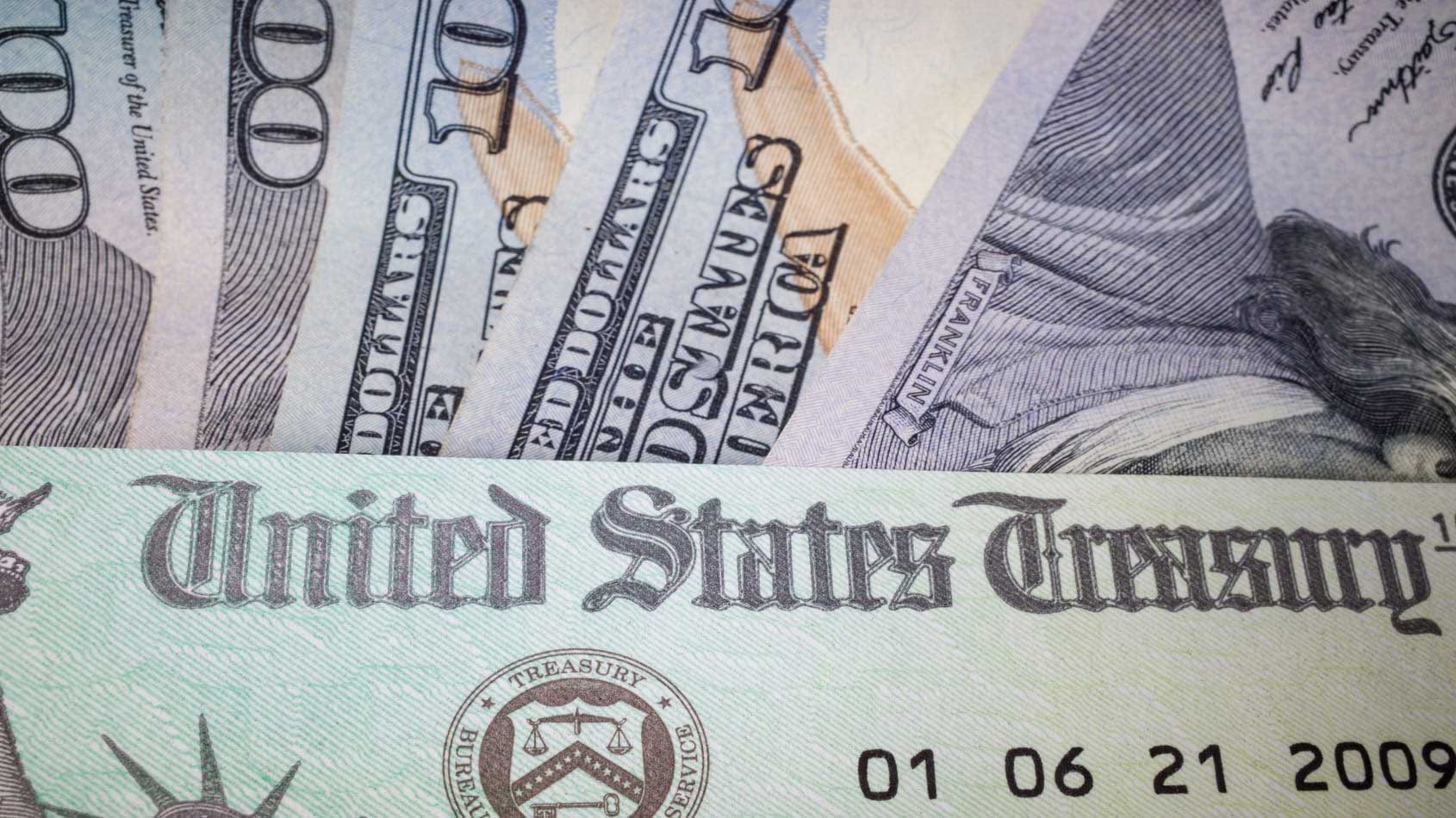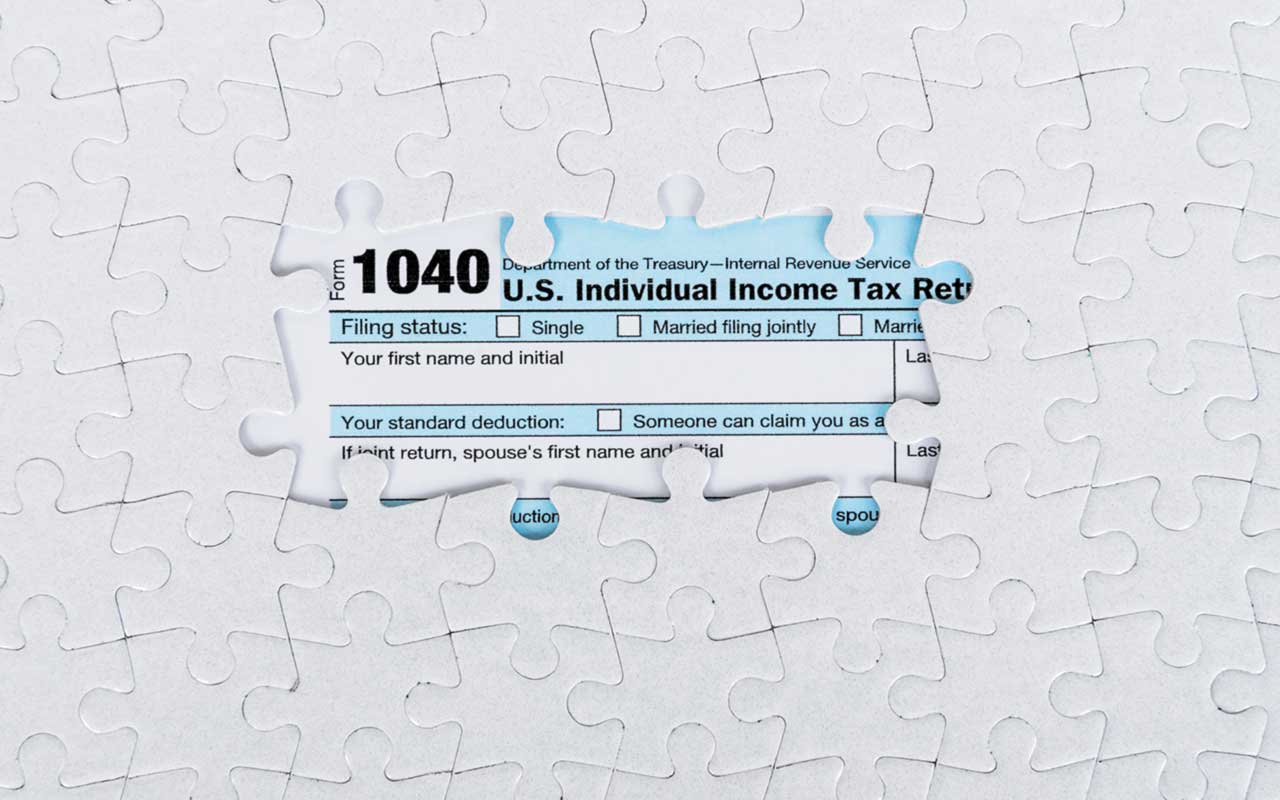What You Should Know About Your State Taxes
Our podcast hosts Sandy Block and Ryan Ermey break down Kiplinger's updated state-by-state tax map. The duo also shares free shipping deals and lesser known Amazon Prime benefits.
Profit and prosper with the best of Kiplinger's advice on investing, taxes, retirement, personal finance and much more. Delivered daily. Enter your email in the box and click Sign Me Up.
You are now subscribed
Your newsletter sign-up was successful
Want to add more newsletters?

Delivered daily
Kiplinger Today
Profit and prosper with the best of Kiplinger's advice on investing, taxes, retirement, personal finance and much more delivered daily. Smart money moves start here.

Sent five days a week
Kiplinger A Step Ahead
Get practical help to make better financial decisions in your everyday life, from spending to savings on top deals.

Delivered daily
Kiplinger Closing Bell
Get today's biggest financial and investing headlines delivered to your inbox every day the U.S. stock market is open.

Sent twice a week
Kiplinger Adviser Intel
Financial pros across the country share best practices and fresh tactics to preserve and grow your wealth.

Delivered weekly
Kiplinger Tax Tips
Trim your federal and state tax bills with practical tax-planning and tax-cutting strategies.

Sent twice a week
Kiplinger Retirement Tips
Your twice-a-week guide to planning and enjoying a financially secure and richly rewarding retirement

Sent bimonthly.
Kiplinger Adviser Angle
Insights for advisers, wealth managers and other financial professionals.

Sent twice a week
Kiplinger Investing Weekly
Your twice-a-week roundup of promising stocks, funds, companies and industries you should consider, ones you should avoid, and why.

Sent weekly for six weeks
Kiplinger Invest for Retirement
Your step-by-step six-part series on how to invest for retirement, from devising a successful strategy to exactly which investments to choose.
Ryan Ermey: Everyone makes a big deal about federal tax rates, but the state you reside in can affect your wallet every bit as much. Kiplinger's State-by-State Tax Map recently went online for 2019 and Sandy breaks it down for you in our main segment. On today's show, we dish on ways to score free shipping as well as some lesser known Amazon prime benefits and a new edition of wild pitches gets a little racy. That's all ahead on this episode of Your Money's Worth. Stick around.
- Episode Length: 00:25:20
- Links and resources mentioned in this episode
- SUBSCRIBE: Apple Google Play Spotify Overcast RSS
Ryan Ermey: Welcome to Your Money's Worth. I'm Kiplinger's associate editor Ryan Ermey, joined as always by senior editor Sandy Block. Sandy, how are you?
Sandy Block: I'm pretty good, Ryan.
From just $107.88 $24.99 for Kiplinger Personal Finance
Become a smarter, better informed investor. Subscribe from just $107.88 $24.99, plus get up to 4 Special Issues

Sign up for Kiplinger’s Free Newsletters
Profit and prosper with the best of expert advice on investing, taxes, retirement, personal finance and more - straight to your e-mail.
Profit and prosper with the best of expert advice - straight to your e-mail.
Ryan Ermey: So this is one of my very favorite times of year. I have a late October birthday. I always have a birthday/Halloween party this time of year. All my family's birthday is clustered in the next couple months or so. And then we have Christmas. So really it ends up being the time of year where I'm ordering a ton of stuff online.
Sandy Block: Right, right.
Ryan Ermey: Which is what we wanted to talk a little bit about today. Amazon Prime really is the, I guess you could call it market leader when it comes to free shipping. Just about everyone knows that you can get free two-day shipping with Amazon Prime. Although an article that we're running in the upcoming issue of Kiplinger's talks about some alternatives if you're looking for free shipping.
Sandy Block: That's right. Free shipping are fast, and free we would put in quotation marks-
Ryan Ermey: Right.
Sandy Block: Because in the case of Amazon Prime you have to pay $119 a year to get this so-called free shipping.
Ryan Ermey: Right.
Sandy Block: But there is a lot of competition, so much so that Amazon has now reduced the wait time to one day. You could order a toothbrush and get it tomorrow in some cases. So it's getting more competition. Target has offered ... has its own subscription service where you can get Target goods delivered. Walmart has gotten into this. And the other thing we want to point out to people is that you really need, first you need to look at what you buy. If you buy most of your stuff from Target or Walmart, maybe that's a better deal. And you can get really free shipping in a lot of cases if you just plan ahead. In the case of Amazon, if you order more than $25 worth of stuff, which it sounds like Ryan, you will probably do-
Ryan Ermey: Right.
Sandy Block: ... and you're willing to wait five to eight days, shipping is free. And that's the case, in a lot of retailers you can get totally free shipping if you buy enough stuff and you're willing to wait a little longer to get it.
Ryan Ermey: Yeah. I think Walmart's deal that they rolled out this year is on orders over $35.
Sandy Block: Right. And Target will do the same. The other thing we want to point out is that in terms of your holiday shopping, an annual event is coming up. December 14th is free shipping day and I believe Ryan, you know more about free shipping day than just about anybody in the office.
Ryan Ermey: Well, it was a staple item in the calendar when I wrote it, I used to put it in. We used to have a year long financial calendar that ran in January and then I put one out every month and that was the only thing that never moved, because people loved it. This year, it's December 14th, so the magic day is, if you order by that day through one of the sites that is affiliated with free shipping day, you know it's FreeShippingDay.com. The language is always thousands of retailers from big-box stores to Etsy artisans.
Ryan Ermey: If you order by that day, they'll guarantee free shipping to arrive by December 24th. But you know, we did want to talk a little bit about Amazon Prime because we've covered it a lot on Kiplinger.com. Bob Niedt has put together a fantastic slide show of benefits that you get for using Amazon Prime, because it does go beyond just getting the shipping.
Sandy Block: Right. And if you're going to spend $119 a year, you really should look at what you're getting beyond free shipping. I mean, what else does it give you? And actually it's quite a lot, a lot of things people don't know about.
Ryan Ermey: It's a lot, and I'm only going to give a couple that were interesting or surprising to me. You should check out the whole slide show, which we'll put up in the show notes. As it pertains to delivery, you can get free same day delivery in 10,000 eligible cities and towns, which is a pretty good swathe there.
Ryan Ermey: Amazon says the package will be delivered by 9:00 p.m. that night if you order by noon. It will also deliver to prime members within two hours for free in 89 select markets or at least at time of the publication of Bob's slideshow. So you can get that toothbrush ASAP when you have a date-
Sandy Block: That's right, no waiting.
Ryan Ermey: No, it comes practically immediately. You mentioned waiting on shipping, which is another thing that Prime members can get. If you select no rush shipping, you can typically get something back for it. I think usually you get a $5 credit.
Sandy Block: Right, and I've done this, because you know, if I'm buying a book, I don't need it today.
Ryan Ermey: Right.
Sandy Block: And you get a $5 credit. So basically you've gotten $5 off your item.
Ryan Ermey: Exactly.
Sandy Block: So I think that's a kind of a cool feature to take advantage of.
Ryan Ermey: So Prime Wardrobe is something that I guess is it was designed to compete with a lot of these like Stitch Fix and-
Sandy Block: thredUP and-
Ryan Ermey: Yeah, all of these different things that will send you a bunch of clothes and you can send them back if you don't like them and keep the ones that you want and pay for them obviously.
Ryan Ermey: So the deal with Amazon is that you pick out clothing, shoes and accessories online. You pick two or more items that they will ship to you for free. You have seven days to try them on and keep what you want to buy and free to return anything you don't purchase. Amazon Smile is something that I thought was quite interesting as well. You can pick a charity, you do all of your shopping on your personal Amazon Smile page and it donates a portion of the sale to a charity of your choice.
Sandy Block: Yeah. And I have used this one to benefit a charity that I support, so others might eat, but it's a very, very, very small percentage of your purchase, but it's free, it's money going into the charity, doesn't cost you anything. So there's really no downside to doing that.
Ryan Ermey: Exactly, 0.5% of the value of your eligible purchases, but obviously no skin off your back. And finally, the last one I wanted to talk about here, Amazon Mom, which used to be Amazon Family, seems like a really, really nice perk. It includes up to 20% off of diapers, baby food, all kinds of kids' stuff, free shipping, free returns. So you know, it's good that Amazon is doing that. Amazon Family for people with little kids. There you go. Stay tuned because Sandy breaks down our state-by-state guide to taxes next.
Ryan Ermey: We're back and in lieu of an outside guest, Sandy today we are talking to you because Kiplinger.com just unveiled the 2019 version of a project that you've worked on over the years. And that is our tax map.
Sandy Block: It's a State-by-State Tax Map and basically it gives you a rundown of how much you'll pay in state taxes. And that includes income, property, gas, even cell phone, sin taxes, sales taxes, the whole works in any state. And I think this is really important and useful information because people are so obsessed with their federal taxes and April 15th and the IRS.
Sandy Block: But state taxes can take a big bite out of your budget too. And literally they are all over the map. And I know this from my own experience. I lived in D.C. for a number of years. I got married and moved to Virginia and I automatically got a raise, because D.C.'s income taxes are much higher than Virginia's. So I think if ... Particularly if you're being offered a job in another state and you're trying to figure out whether the pay is competitive, you really want to figure out how much of that pay is going to have to go to state taxes.
Sandy Block: And it's really important if you live in an area like we do where D.C., Virginia, and Maryland are very close to each other and you could live in any of these jurisdictions if you work in D.C. Or one of the states, but the one you choose really could affect how much you have to pay. And so in our tax map we give the 10 most tax friendly states and 10 least tax friendly states. And you can also just drill down to each state and get an idea of what you'll have to pay to live there.
Ryan Ermey: Right. So there is going to be some legwork on the part of anyone who is using this as a tool to determine what they're going to pay. Because for one thing, we give estimates for like a kind of middle of the road in terms of income couple.
Sandy Block: Right, you got married couple with the home.
Ryan Ermey: Married couple with a home and like you said, it's going to be a little bit different depending on where you live, the kind of taxes you pay. I for instance, I live in D.C., which is pricey, but I also do get a rather large credit because my rent is expensive enough that it exceeds my income by a certain amount. So there is going to be some dreaded math involved.
Sandy Block: Right. And your own personal circumstances and you make a good case if you ... the property taxes, they take a big account in this and if you aren't a home buyer that's not as big a deal to you. Sales taxes, typically states exclude groceries and prescription drugs. So to some extent, whether that's a big deal, depends on how much you spend on clothes and other things. And the other thing we always, I always want to point out when I do interviews about this tax map is to some extent you get what you pay for. Some people are more than happy-
Ryan Ermey: Yes.
Sandy Block: ... to live in a high tax state or a high tax county if it has excellent schools, good roads, good services.
Ryan Ermey: Right.
Sandy Block: Versus maybe a state with very low taxes where the cops don't come when you call and there's potholes all over the place and the schools are bad. So you do have to take that into account. But I think the real usefulness of this tax map is it does allow you to see if you're getting what you're paying for. If you live in a high tax state, and you still have potholes and the cops don't come when you call, then you got to really think about, do I want to stay here? Should I become more politically active or, anything.
Ryan Ermey: Right, run for office.
Sandy Block: So I think it's just good and it's also just a good way to when you're doing your budget to make sure you don't overlook what could be a significant item on your budget.
Ryan Ermey: So taking a look at the map. I'm sure there are some sort of usual suspects when it comes to low tax states. I know NBA players love to go ... You know, writers have really just started taking this into consider, because you're always trying to guess where are they going to in the team, but they tend to gravitate Houston and-
Sandy Block: Florida.
Ryan Ermey: ... Miami end up looking pretty attractive because-
Sandy Block: No income taxes in that state.
Ryan Ermey: Exactly. Right. So you get to keep quite a bit more of that contract.
Sandy Block: Talk to LeBron.
Ryan Ermey: But what are some that might surprise people in terms of the friendliest and some of the least friendly?
Sandy Block: As you said, the friendliest are not really a big surprise, because most of them are states with no income tax. Nevada, Alaska, as we mentioned, Florida has no income tax. Texas has no income tax but it does not make our most friendly list because it has pretty high property taxes and that's an important thing to take into account. Tennessee does make our most friendly list, but it's important to know that it has very high sales taxes. If a state has no income tax and wants to keep the lights on, it's got to get the money from somewhere.
Ryan Ermey: Right.
Sandy Block: Now in the case of Wyoming and Alaska and maybe even Nevada, because they've got the gaming, they get a lot ... Wyoming and Alaska get a huge amount of money from natural resources.
Ryan Ermey: Right.
Sandy Block: So you don't have to tax people, but a lot of other States do. So, look into the trade-offs but are our most friendly states I don't think would come as a huge surprise to people. Our least friendly states contain a few I think things that might surprise you. People would not be surprised to see a lot of New England States like Connecticut and New York on our least friendly list. They have a reputation for high taxes.
Ryan Ermey: Yes.
Sandy Block: But our least friendly state is actually Illinois, and that's because their property taxes are really, really high and they have a lot of fiscal problems that suggest that they're not in any position to lower taxes and probably will have to raise them. A couple other examples of states that make our least friendly list that might surprise people, Nebraska, Iowa, Ohio and Kansas all make our least friendly list.
Sandy Block: And you know, Kansas has made a lot of news saying that they lower their taxes but in fact they have really high sales taxes and their income taxes are no party either. Iowa has the 12th highest property taxes in the country so that farm is going to cost you. So again, this sort of points out the importance of really drilling down if you're looking at a particular state to see. Don't assume it's a high tax state or a low tax state for you or in general, because it is. But all of the information is there on our tax map and you can sort of do your own analysis and figure out if you want to move or if you don't, just how much you need to put aside to pay the state come tax time.
Ryan Ermey: So that's going to be Kiplinger.com/links/taxmap. That is our tax map, or State-by-State breakdown for everybody. Now I know another one that is going to be coming around the bend here is our retiree tax map and we'll be sure to let our dear, dear listeners know when that is coming. But just as a preview, how does that project differ from this one?
Sandy Block: It differs significantly because a lot of states, including some with pretty high tax rates, carve out a significant amount of retirement income, they just don't tax it. Like some, they may not tax your IRA and 401(k) withdrawals at all or they may have a huge exemption. So some states that look not so friendly for everybody can be very friendly for retirees. And I think we've been doing the retiree tax map for a long time and it gets a lot of attention because retirees really do have flexibility. A lot of people, they can live wherever-
Ryan Ermey: Yeah, up and move.
Sandy Block: They will move where they want and there's a reason they're moving the Florida as we discussed. But I think our retirement tax map can give people some other ideas of where they want to go or how much it will cost them to stay. So that's going to come out in a couple of weeks and we'll definitely mention that when it's available to the people. But it's one that gets a lot of attention and I think for good reasons.
Ryan Ermey: All right, so we'll be looking forward to that. Be on the lookout. In the meantime, Kiplinger.com/links/taxmap, go check it out. Use it as a tool just in case you're considering moving, taking a new job, or just want to know if you're paying too much. Coming up: U.S. tariffs on Chinese-made goods stretch far and wide... and wild pitches is next.
Ryan Ermey: We are back, and before we go a new edition of one of our very, very favorite segments, Wild Pitches, tales of our wackiest PR proposals, and I'm going to go first and this falls into a category that has appeared before on this segment, which I like to call surveys of dubious provenance. So this one's actually from a legitimate source. It's from Experian, but it's also, it falls into another category, which is about, it's about millennials. So while millennials are obsessed with social media, likes and followers, new findings show that they are actually concerned with prioritizing the numbers that truly affect their life and financial future credit scores.
Ryan Ermey: The survey from Experian reveals that 53% place more importance in trying to increase their scores versus growing their followers on social media platforms, which I don't know about that. But like with social media, this generation compares themselves to their peers when it comes to scores and ratings in general. And 48% said they get anxiety knowing someone in their circle has a higher score, which get the hell out of here. No, we don't.
Sandy Block: You like swap scores while you're ... After softball, like, "Dude, I'm 750, how about you?"
Ryan Ermey: I just don't understand. So like, yeah, and this is one of these surveys that I have to wonder like, "How did you ask?" Right? It's like, "Well, your friend has an 800, would you feel inadequate if yours was 750?" So look, it's probably good, if there's any truth to it, it's good that young people, and I'm just going to start, we should just start saying young people.
Sandy Block: Yeah.
Ryan Ermey: Millennials is losing its meaning.
Sandy Block: It is. Like you said, they're buying houses.
Ryan Ermey: It's like anyone who wants to ... Like anyone who wants to get off your lawn is a millennial. I'm like a younger millennial. I'm turning 29 years old this year.
Sandy Block: That's right, that's right.
Ryan Ermey: So anyway, it's good that young people care about boosting their credit scores. We like that here at Kiplinger and we have a couple of ideas to help you do it. And one is to apply for a credit card, which is a pretty straightforward one.
Ryan Ermey: To build a positive history you should pay your bills by the due date. Try to keep your balance to less than 20% to 30% of the card's limit. Because as we've discussed in this show, your utilization ratio comes into play in your credit score. If you're a little bit younger, becoming an authorized user on a parent's credit card is a common way to build credit if your parents indeed have good credit.
Sandy Block: That's right.
Ryan Ermey: I was lucky enough to have parents who had pretty good credit so I have pretty good credit, or I at least started out with pretty good credit. But I have maintained it-
Sandy Block: Yeah, and your friends are so jealous.
Ryan Ermey: That's exactly right. Another idea is student credit cards. We like the Discover it Chrome for students. The rationale behind this is that card issuers are usually more lenient in evaluating a student card applicant's income and credit history. So it's just like a little bit easier than maybe getting a standard card if you're just starting out.
Ryan Ermey: A secured card is another idea. Essentially you're going to put a deposit down, which is often equal to the cards limit. If you fail to pay the bill, the issuer can just go into the deposit. And the last thing I wanted to mention was that there are some new tools and I want to give Experian a little bit of credit here. They have a service called Experian Boost, which you can sign up for and it will consider on time payments of bills that you owe to utility companies, phone companies, cable companies.
Ryan Ermey: These things aren't typically reported on your credit file, but this will take these kinds of things into consideration, which is really good for someone who, maybe you're out of college, you haven't gotten your first credit card yet, but you still are keeping your lights on and keeping your cable and your wifi on. So those are all ways to boost your scores. Lisa Gerstner, who has been a guest on the show a few times now has a couple more ways in a piece that she has on kiplinger.com which we will put in the show notes. Sandy, what pitch do you have for us this week?
Sandy Block: My pitch is truly wild, Ryan. and it's actually been sitting in my inbox since August, but it's actually quite topical right now. It comes from Romantic Adventures-
Ryan Ermey: Oh.
Sandy Block: ... which describes itself as a leading adult novelty retailer based in Jackson, Mississippi. And is urging consumers to do their holiday shopping a little earlier this year to avoid a pending December 15th hike on tariffs on all kinds of items. I don't know, the tariff story changes daily. So who knows what's going to happen on December 15, but if nothing happens, this is accurate. There will be tariffs on everything from smart phones to all kinds of toys for all ages.
Ryan Ermey: Right, so this particular pitch pertains to adult accoutrement.
Sandy Block: Adult accoutrement, and what they ... Anything with small motors and batteries, which apparently they have a large stock up. So they're urging people to stock up on sex toys for themselves or for their loved ones before-
Ryan Ermey: It's a gift.
Sandy Block: ... December 15 and now as I said, there is some ... and they also point out that there is no time like the present to have a good time. Now okay. A couple of caveats here is they're right. I mean, there are these tariffs scheduled to take effect December 15th, and if you find a good deal on anything that will be affected, and a lot of things will be affected between now and then. Sure, go ahead and pull the triggers, stock up on whatever.
Sandy Block: But I would discourage people from being swayed to buy things by the hype. I can just picture as this deadline gets closer, all kinds of retailers, not just sex toys are going to be telling people, "You know, you better get out there and buy now because prices are going to go up." Well, as we always say on this show, shop around, it's going to be very competitive. There'll be all kinds of deals and oftentimes as we get closer to the holidays there's lots of deals. We don't know how much retailers are going to basically eat the tariffs or pass them on to other people.
Sandy Block: So this is, and as I said, this is a really moving target. So sure, if you find a good price on something and you get free shipping and you want to give somebody a very special gift for the holidays, go ahead, buy. I would say don't be pressured into spending more than you normally would because of this deadline, because this tariff story changes by the day.
Ryan Ermey: There you have it. That's it for this episode of Your Money's Worth. For show notes and more great Kiplinger content on the topics we discussed on today's show, visit kiplinger.com/links/podcasts. You can stay connected with us on Twitter, Facebook or by emailing us at podcast@kiplinger.com. And if you like the show, please remember to rate, review and subscribe to Your Money's Worth wherever you get your podcasts. Thanks for listening.
Links and resources mentioned in this episode
Profit and prosper with the best of Kiplinger's advice on investing, taxes, retirement, personal finance and much more. Delivered daily. Enter your email in the box and click Sign Me Up.

Block joined Kiplinger in June 2012 from USA Today, where she was a reporter and personal finance columnist for more than 15 years. Prior to that, she worked for the Akron Beacon-Journal and Dow Jones Newswires. In 1993, she was a Knight-Bagehot fellow in economics and business journalism at the Columbia University Graduate School of Journalism. She has a BA in communications from Bethany College in Bethany, W.Va.
-
 Betting on Super Bowl 2026? New IRS Tax Changes Could Cost You
Betting on Super Bowl 2026? New IRS Tax Changes Could Cost YouTaxable Income When Super Bowl LX hype fades, some fans may be surprised to learn that sports betting tax rules have shifted.
-
 How Much It Costs to Host a Super Bowl Party in 2026
How Much It Costs to Host a Super Bowl Party in 2026Hosting a Super Bowl party in 2026 could cost you. Here's a breakdown of food, drink and entertainment costs — plus ways to save.
-
 3 Reasons to Use a 5-Year CD As You Approach Retirement
3 Reasons to Use a 5-Year CD As You Approach RetirementA five-year CD can help you reach other milestones as you approach retirement.
-
 PODCAST: Decoding ESG Investing with Ellen Kennedy
PODCAST: Decoding ESG Investing with Ellen KennedyBecoming an Investor Environmental, social and governance investing is simpler than it sounds, and has a profitable track record to boot.
-
 PODCAST: National Taxpayer Advocate Erin M. Collins Wants to Help
PODCAST: National Taxpayer Advocate Erin M. Collins Wants to HelpFinancial Planning Your tax dollars are at work funding a government bureau to help you deal with the IRS. Strange but true! Also, the price of Amazon is going up.
-
 PODCAST: The “Gray Resignation” with Liz Windisch
PODCAST: The “Gray Resignation” with Liz WindischMaking Your Money Last Pandemic pressures (and high stock and real estate values) are leading many to try to move up retirement. Plus, tax-filing season gets under way.
-
 PODCAST: Get the Most from the Expanded Child Tax Credit
PODCAST: Get the Most from the Expanded Child Tax CreditTax Breaks The latest government stimulus is a much-more generous child tax credit, with a new twist: The IRS is going to send you money each month, if you're eligible. Also, what marrying will do to your taxes.
-
 PODCAST: Max Out Your Stimulus Check with Rocky Mengle
PODCAST: Max Out Your Stimulus Check with Rocky MengleTax Breaks You probably know you're getting a stimulus check, but did you know you can have an impact on its amount? Senior tax editor Rocky Mengle talks about the moves you can make to upsize your stimulus. Also, will your state raise — or lower — your taxes.
-
 PODCAST: Why Pay Money to File Your Taxes?
PODCAST: Why Pay Money to File Your Taxes?Tax Breaks Far more people could be filing their federal returns for free; maybe even their state taxes. Also, the latest from Brandon Copeland and the not-so-secret perks of stock ownership.
-
 PODCAST: Taxes and Insurance When Working from “Home”
PODCAST: Taxes and Insurance When Working from “Home”Tax Breaks Working remotely in a new state, maybe even a new country? That can lead to complications, particularly when it comes to taxes. Also: why the IRS is starting tax season late this year, and a check-in on student loan policies in the new administration.
-
 PODCAST: Taxes on Retirees — What’s New
PODCAST: Taxes on Retirees — What’s NewBudgeting In this episode of Your Money's Worth, senior tax editor Rocky Mengle talks about the latest update of the Kiplinger Retiree Tax Map. Will states with declining revenues make life harder on retirees? Also, the Biden stimulus plan and the hazards of patent scams.

